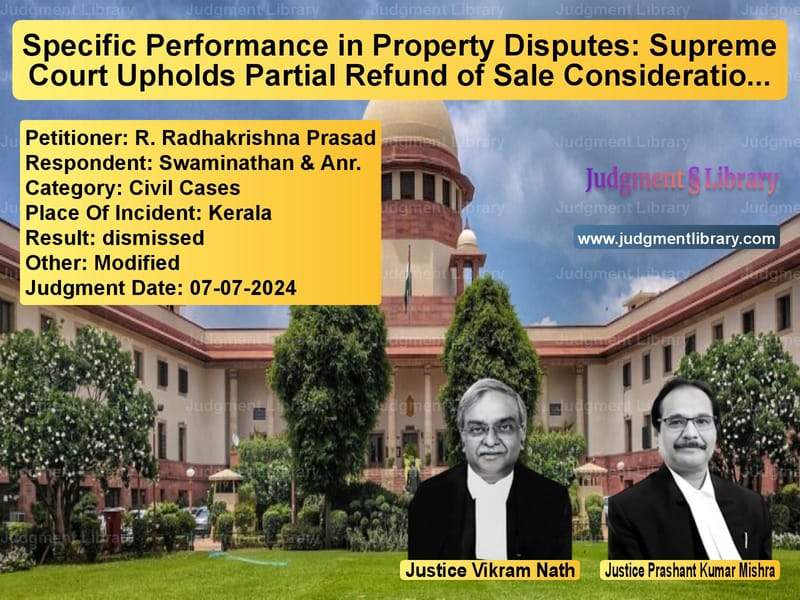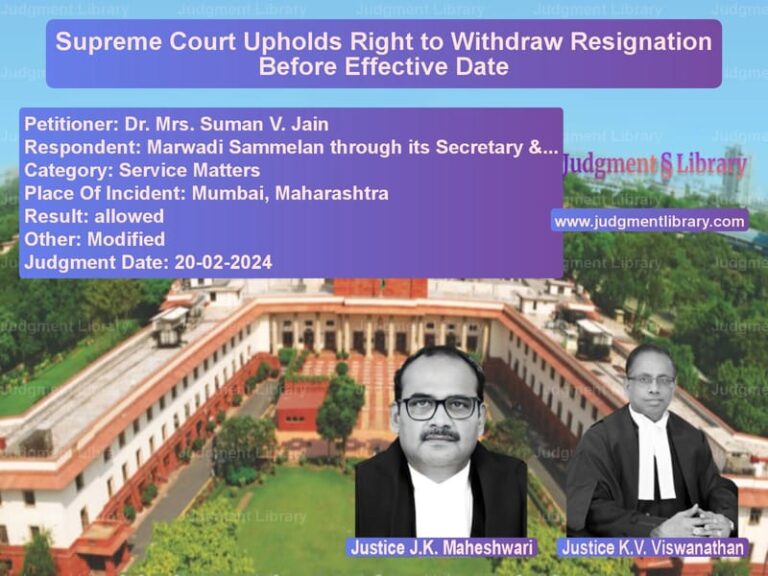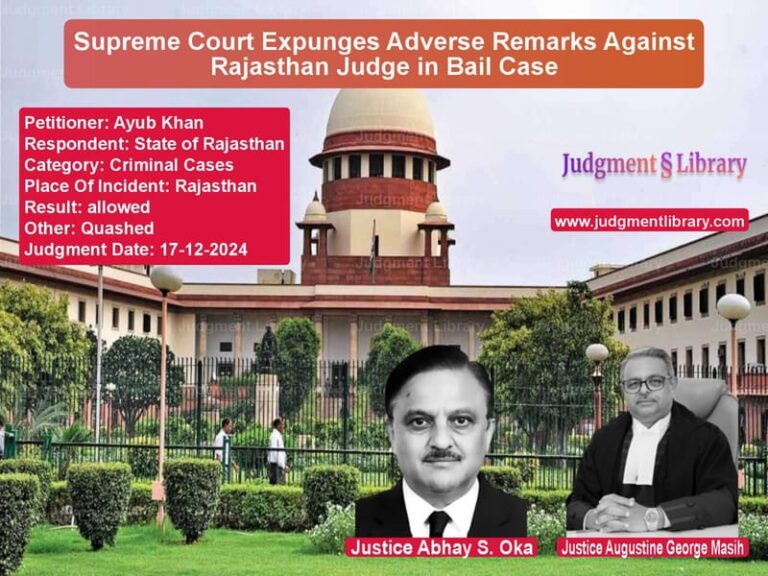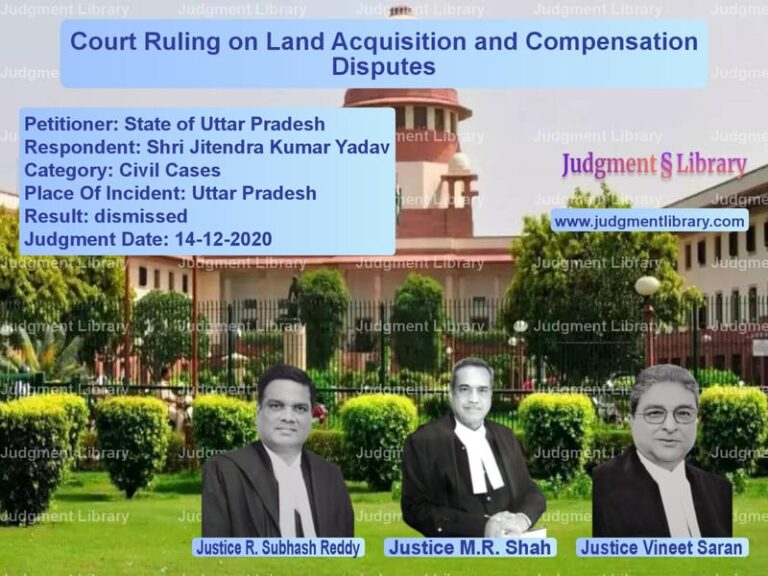Specific Performance in Property Disputes: Supreme Court Upholds Partial Refund of Sale Consideration
The Supreme Court of India, in its judgment dated July 8, 2024, addressed a dispute concerning the enforcement of a property sale agreement and the claim for refund of advance sale consideration. The case, R. Radhakrishna Prasad vs. Swaminathan & Anr., involved the appellant’s plea for specific performance of a property sale agreement, which was initially granted in part by the trial court but later modified by the Kerala High Court. The Supreme Court upheld the High Court’s ruling, limiting the refund to Rs. 3,00,000/- instead of the claimed Rs. 18,00,000/-.
Background of the Case
The dispute arose from an agreement for the sale of a property, executed on March 26, 1998, between the appellant, R. Radhakrishna Prasad, and the first respondent, Swaminathan. The key terms of the agreement were:
- The sale price of the property was fixed at Rs. 30,00,000/-.
- The respondent received an advance payment of Rs. 3,00,000/-.
- The sale deed was to be executed within six months.
- The respondent had an outstanding loan against the property, for which an additional sum of Rs. 15,00,000/- was allegedly paid by the appellant.
- The agreement was later extended for one more year.
The appellant claimed that he was always ready and willing to perform his obligations under the agreement, but the respondent failed to execute the sale deed. Consequently, he filed a suit for specific performance or, alternatively, a refund of the advance amount along with interest.
Defendant’s Arguments
The first respondent, Swaminathan, contested the suit, arguing:
- He never executed the sale agreement and had no acquaintance with the appellant.
- The document relied upon by the appellant was allegedly forged.
- The property was worth more than Rs. 1,00,00,000/-, making the agreement price unrealistic.
- The alleged payments were orchestrated by a third party, K.K. Vijayadharan Pillai, who had a history of financial dealings with the respondent.
Trial Court’s Decision
The Trial Court found that:
- The sale agreement was executed by the respondent.
- Witness testimonies corroborated the appellant’s claim of having entered into the agreement.
- However, given the increase in property value, specific performance was not granted.
- The court directed the respondent to refund the appellant Rs. 18,00,000/- with 12% annual interest.
High Court’s Judgment
The Kerala High Court, on appeal by the respondent, modified the trial court’s order:
- It reduced the refund amount to Rs. 3,00,000/-, citing lack of proof for the additional Rs. 15,00,000/- payment.
- The appellant failed to produce receipts for the alleged additional payments.
- Endorsements in the agreement were deemed questionable due to inconsistencies.
- The advocate’s notice issued before the suit did not mention the disputed amount.
Supreme Court’s Analysis
1. Legitimacy of the Agreement
The Court noted that the agreement was duly signed and attested, and its execution was not seriously challenged in the appeal.
2. Proof of Additional Payment
The Court scrutinized the appellant’s claim of having paid an additional Rs. 15,00,000/-:
- The plaintiff relied solely on his testimony.
- There was no documentary proof (such as bank records or receipts).
- The advocate’s notice did not specify the total amount claimed.
- The respondent’s signature appeared after the witness’s signature in the disputed endorsement, raising doubts.
3. Judicial Precedents on Refund in Specific Performance Cases
The Court reiterated that in cases where specific performance is denied, a refund of consideration is permissible only if sufficiently proven. Given the lack of substantial evidence, the High Court’s decision to limit the refund to Rs. 3,00,000/- was upheld.
Final Verdict
- The appeal was dismissed.
- The respondent was ordered to refund Rs. 3,00,000/- with 12% annual interest.
- The parties were directed to bear their own costs.
Key Takeaways
- Specific Performance is Not an Absolute Right: Courts may deny specific performance based on equitable considerations such as property value appreciation.
- Documentary Proof is Crucial: Claims for additional payments must be backed by substantial evidence.
- Inconsistencies in Evidence Can Weaken a Case: Discrepancies in endorsements and prior notices influenced the Court’s decision.
- Courts Can Modify Relief: Even if specific performance is denied, courts may still grant partial refunds.
Conclusion
This ruling reaffirms the principle that claimants in property disputes must provide clear and convincing evidence when seeking enforcement of agreements. The Supreme Court’s decision emphasizes the need for proper documentation and consistency in claims, ensuring fairness in contractual disputes.
Petitioner Name: R. Radhakrishna Prasad.Respondent Name: Swaminathan & Anr..Judgment By: Justice Vikram Nath, Justice Prashant Kumar Mishra.Place Of Incident: Kerala.Judgment Date: 07-07-2024.
Don’t miss out on the full details! Download the complete judgment in PDF format below and gain valuable insights instantly!
Download Judgment: r.-radhakrishna-pras-vs-swaminathan-&-anr.-supreme-court-of-india-judgment-dated-07-07-2024.pdf
Directly Download Judgment: Directly download this Judgment
See all petitions in Contract Disputes
See all petitions in Property Disputes
See all petitions in Damages and Compensation
See all petitions in Judgment by Vikram Nath
See all petitions in Judgment by Prashant Kumar Mishra
See all petitions in dismissed
See all petitions in Modified
See all petitions in supreme court of India judgments July 2024
See all petitions in 2024 judgments
See all posts in Civil Cases Category
See all allowed petitions in Civil Cases Category
See all Dismissed petitions in Civil Cases Category
See all partially allowed petitions in Civil Cases Category







